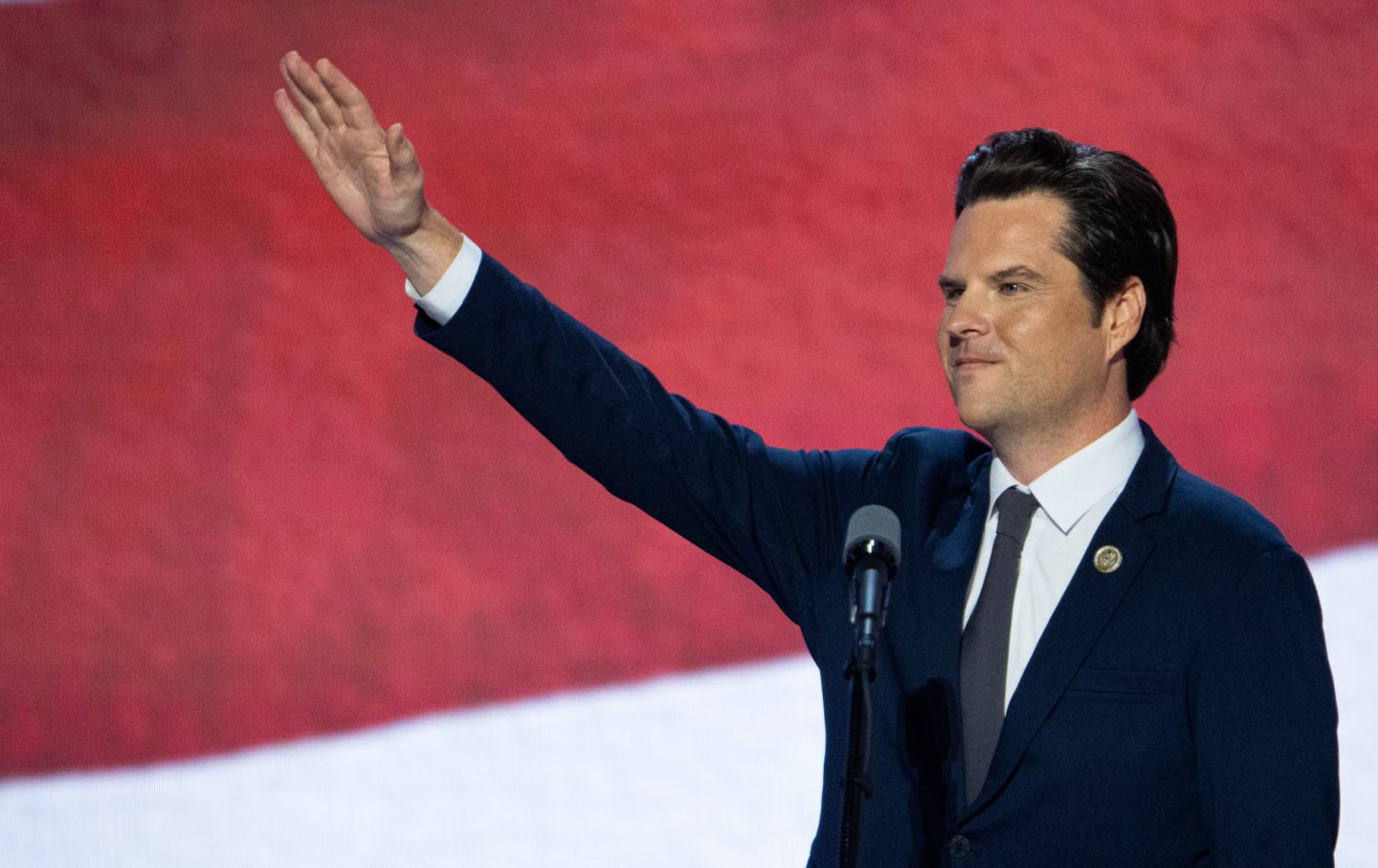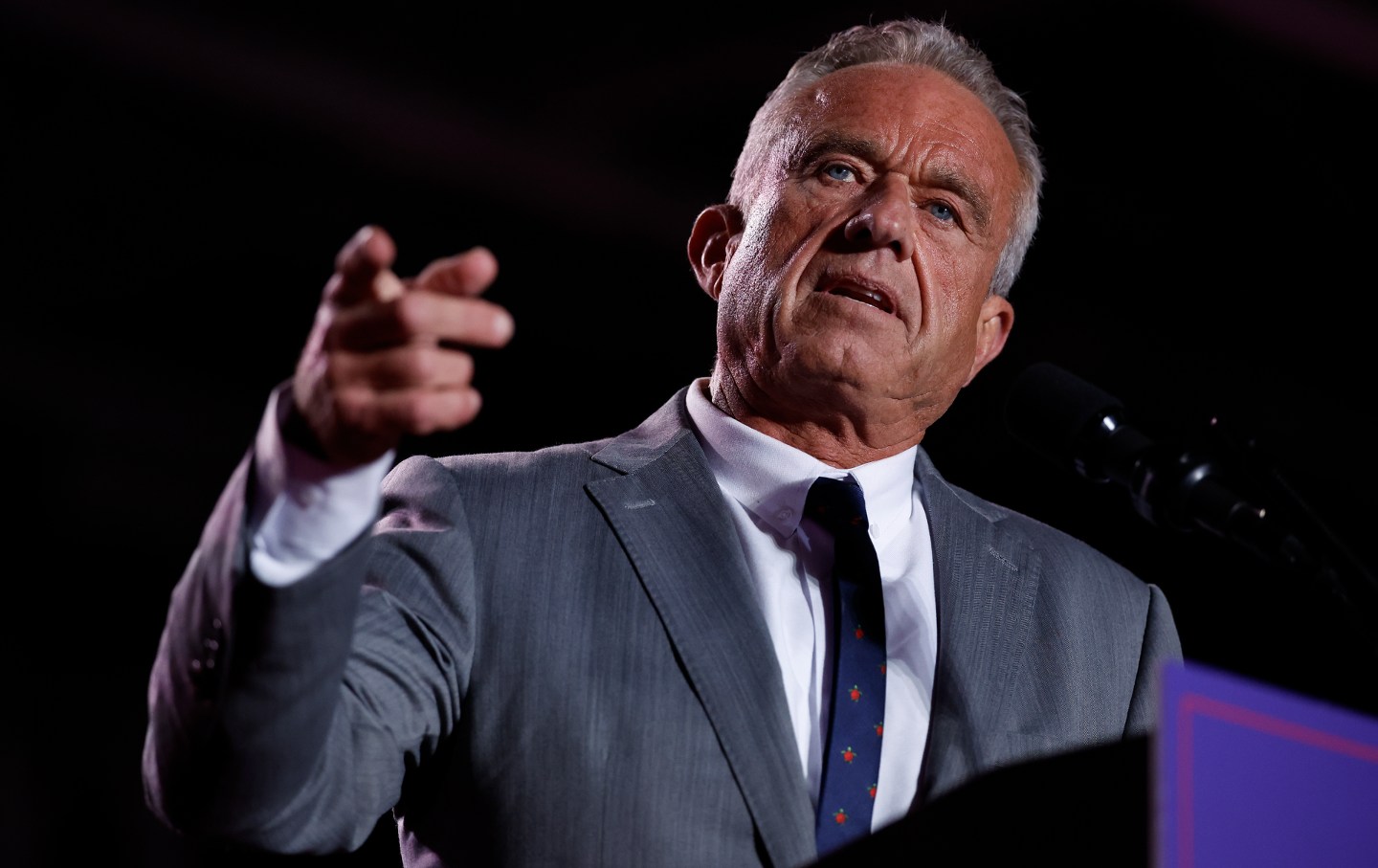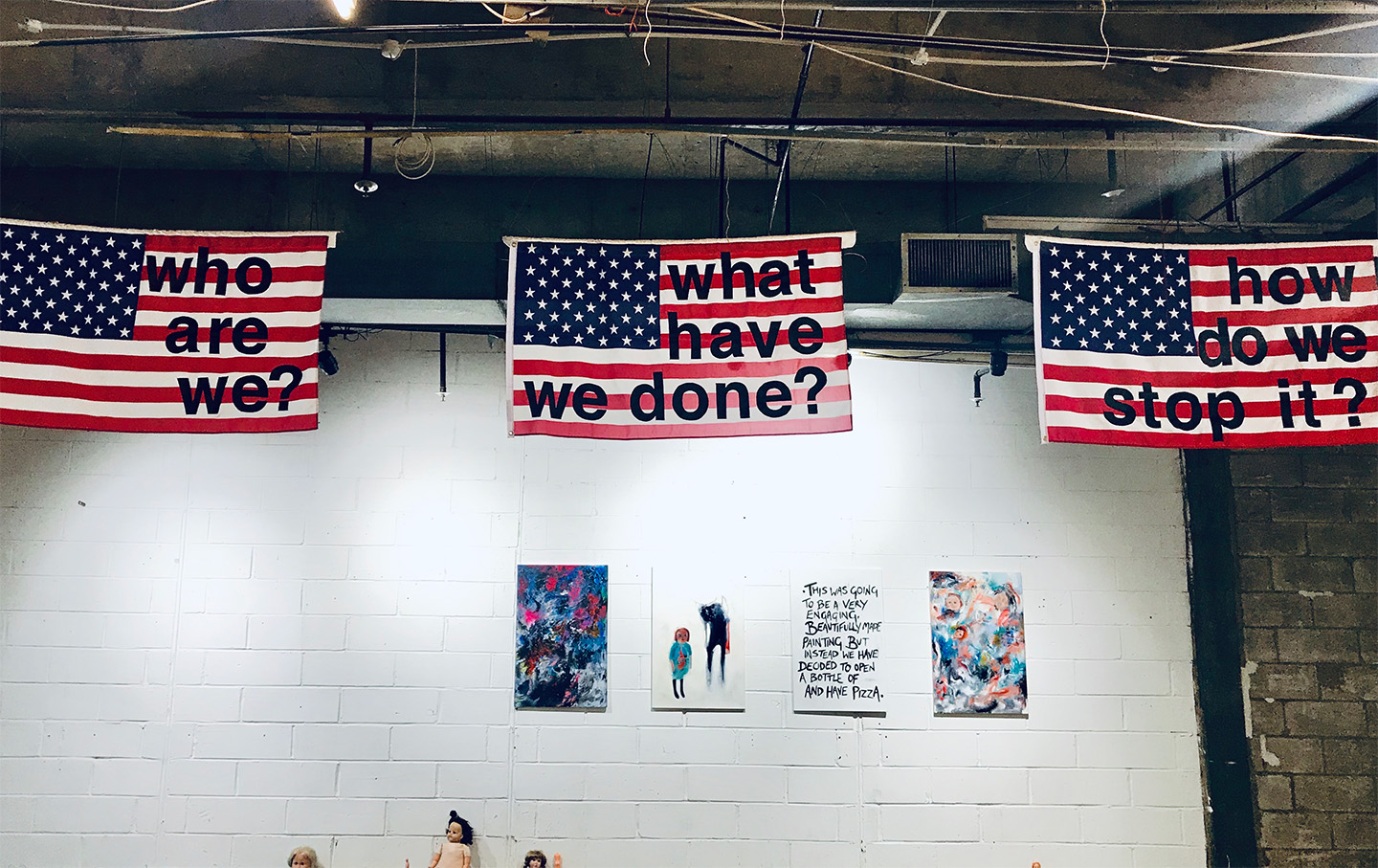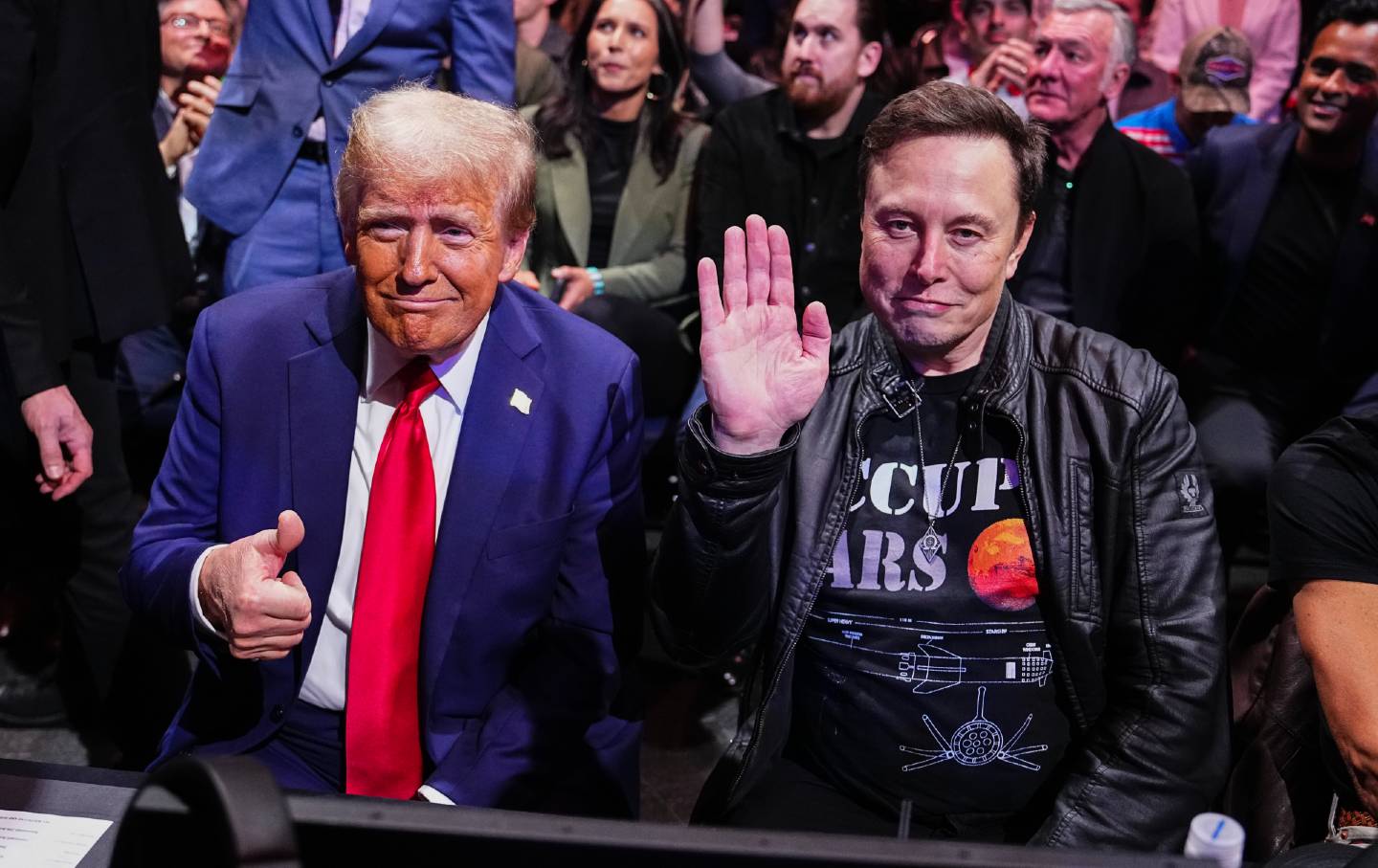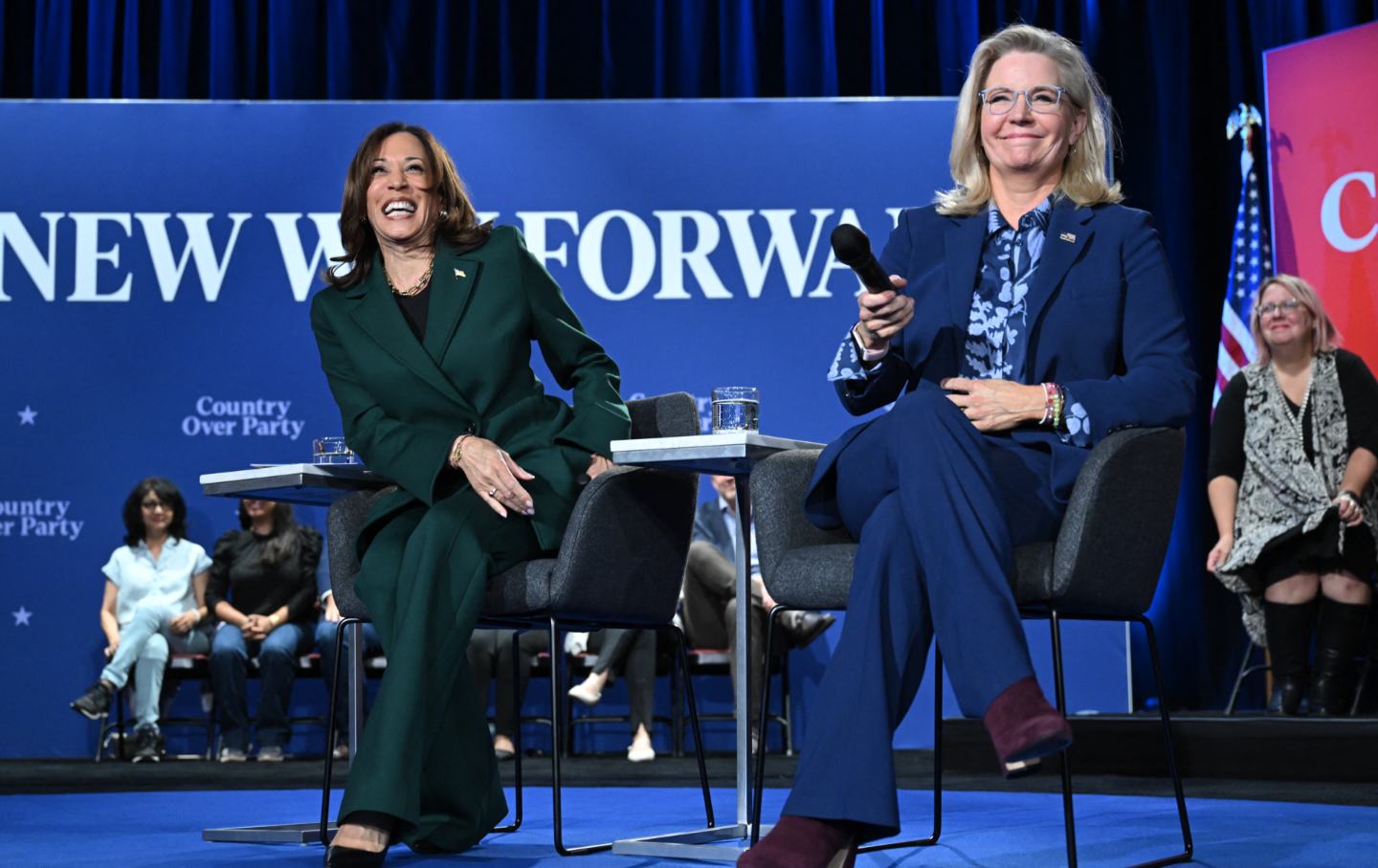Tim Walz Is the Perfect Foil to the Fraud That Is JD Vance
The Democratic nominee for vice president is a happy warrior whose convention speech proved he can take on his “dark and ominous” GOP rival.
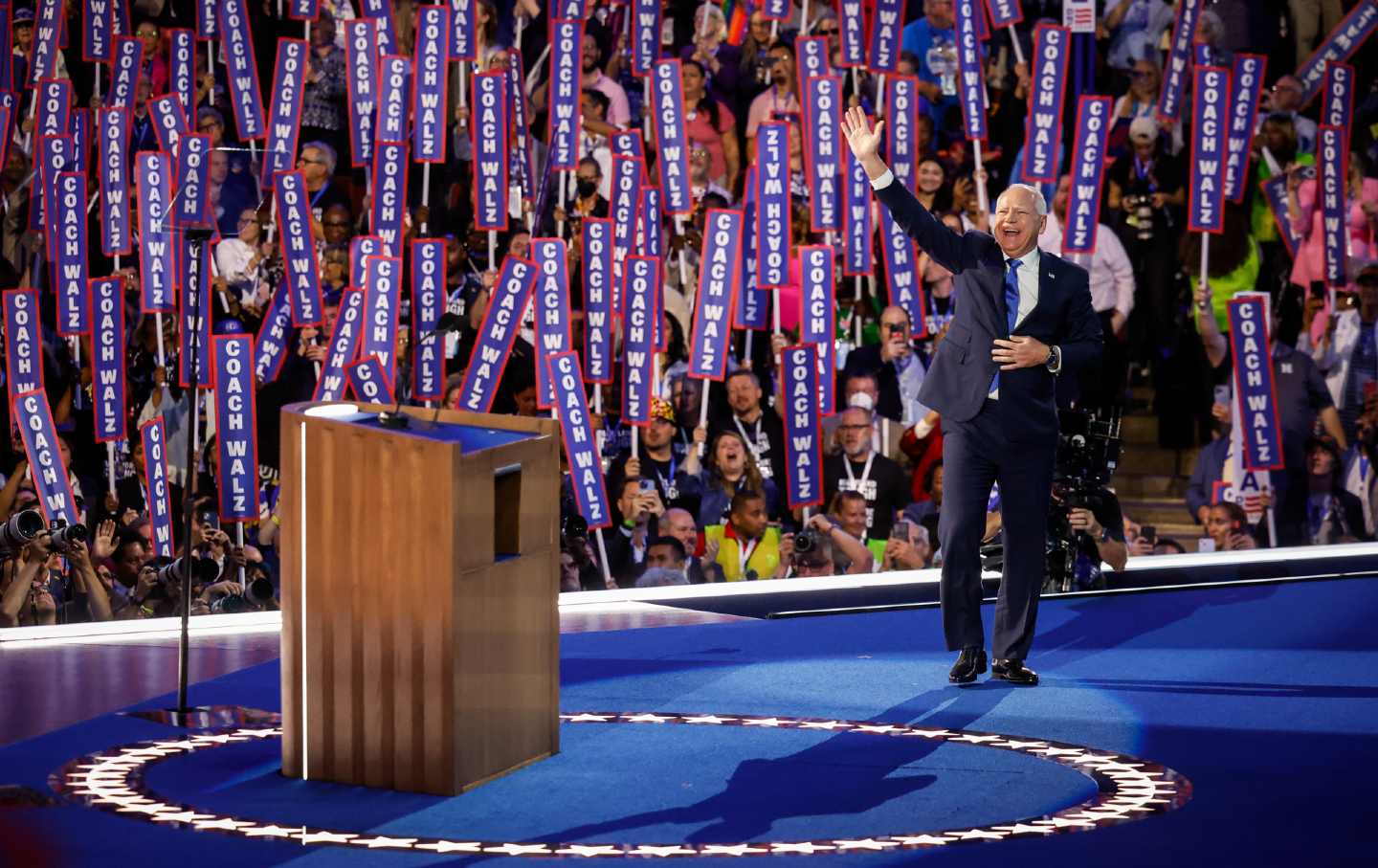
Minnesota Governor Tim Walz arrives to speak on stage during the third day of the Democratic National Convention at the United Center on August 21, 2024, in Chicago.
(Kevin Dietsch / Getty Images)
Chicago—Tim Walz took the stage at the Democratic National Convention to the chords of John Mellencamp’s “Small Town,” an almost 40-year-old hit song from when Ronald Reagan was president and his administration’s policies were devastating rural America. “Small Town” appeared on the 1985 album Scarecrow, which featured a title track, “Rain on the Scarecrow ,”which recounted the suicides of farmers forced into bankruptcy. During that economic crisis, Reagan and his Republican allies sided with big agribusiness against the people who worked the land and against the Main Street businesses that were being wiped out by Wall Street–backed chain stores.
Like Bruce Springsteen’s “Born in the U.S.A.,” Mellencamp’s song is often misinterpreted as an upbeat “morning in America” anthem. But it’s really a reminder that people still lived in the “flyover” country.
Four decades after Republicans (and too many Democrats) embraced the neoliberal gospel of the billionaire class—with its advocacy of “free trade” agreements, corporate consolidation, and monopoly—Walz is running for the vice presidency of the United States as a champion of what was lost. Or, perhaps, of what might be regained from an embrace of the values and ideals of the places Mellencamp fought to preserve when he sang about how “I cannot forget from where it is that I come from.… I cannot forget the people who love me.”
Walz does not forget where he came from. That’s why, in her shrewdest move as the Democratic nominee for president, Kamala Harris invited Walz to be her running mate—giving the governor of Minnesota a platform to reassert those values in a race against a Republican ticket that’s led by a billionaire from New York and a Yale-educated venture capitalist.
When Donald Trump chose JD Vance as his running mate, the former president and his marketing team imagined that because Vance had written a lamentable book about an Appalachian region that he visited on summer vacations, he would lend some sort of small-town authenticity to the GOP brand.
But that was never going to happen.
Vance was born and raised in Middletown, Ohio, a midsize manufacturing city that is the kind of place to which people from small towns drive when they need to pick something up at the Walmart Supercenter.
Walz, on the other hand, is the real thing, as the governor of Minnesota recalled in his boisterous address to the Democratic delegates and to voters across the country in his Wednesday night acceptance speech.
“Now, I grew up in Butte, Nebraska, a town of 400 people. I had 24 kids in my high school class and none of them went to Yale,” announced Walz, as the crowd roared with laughter over his nod to Vance’s résumé.
Those sorts of references unsettle Vance, who on Wednesday night rushed to his safe place, Fox News, to attack “the dark and ominous tone” of Walz’s speech, during which the governor announced that Democrats were “bringing the joy to this fight.”
Popular
“swipe left below to view more authors”Swipe →The contrast between Vance’s actually dark-and-ominous views and Walz’s politics of joy will frame much of the debate this fall. There is no question that Harris and Trump, as the presidential nominees of the two major parties, will be the definitional figures in the race. But Walz and Vance are more than traditional running mates. They were each chosen to amplify the core themes and values of the campaigns.
Vance, in his book Hillbilly Elegy and in his politics, has always seen the middle of the country—which he abandoned to pursue education on the East Coast and wealth on the West Coast—as a forbidding land, where drug addiction and economic desperation stalk communities and where the “wokeness” of “childless cat ladies” threatens to destroy what is left of the American dream.
Walz is the opposite.
He sees the America of his native Nebraska and his adopted Minnesota as a place where good people take care of one another. And, from that place, he brings to the national stage a politics of uplift and inclusion. After acknowledging that he and his classmates did not join JD Vance in the halls of New Haven, Walz said, “But I’ll tell you what, growing up in a small town like that, you’ll learn how to take care of each other that that family down the road, they may not think like you do, they may not pray like you do, they may not love like you do, but they’re your neighbors and you look out for them and they look out for you. Everybody belongs and everybody has a responsibility to contribute.”
More from the 2024 DNC:
Walz recognizes that those values, like the values of the urban neighborhoods that were equally neglected by Reagan and equally damaged by the neoliberal assault from vulture capitalists like Vance, are best renewed and advanced by a government that respects individual freedom. So it was that Walz who told the delegates that u as the Democratic governor of Minnesota, “We protected reproductive freedom because, in Minnesota, we respect our neighbors and the personal choices they make. And even if we wouldn’t make those same choices for ourselves, we’ve got a golden rule: Mind your own damn business!”
At the same time, Walz recognized—as did Franklin Delano Roosevelt and the New Deal Democrats who swept to victory in rural America—that there is a place for an engaged and activist government that counters the worst excesses of Wall Street investment bankers and right-wing book banners.
After his election as governor in 2018, Walz recalled, “We got right to work, making a difference in our neighbor’s lives. We cut taxes for the middle class. We passed paid family and medical leave. We invested in fighting crime and affordable housing. We cut the cost of prescription drugs and helped people escape the kind of medical debt that nearly sank my family. And we made sure that every kid in our state gets breakfast and lunch every day. So, while other states were banning books from their schools, we were banishing hunger from ours.”
In a convention that featured plenty of soaring rhetoric, Walz’s simple statement of values, with its focus on the right to read and the necessity of ending childhood poverty, and with its understanding of the role and the power of government, said everything about the difference between Vance’s “dark and ominous” Republican Party and a Democratic Party that opts for freedom and joy.
We cannot back down
We now confront a second Trump presidency.
There’s not a moment to lose. We must harness our fears, our grief, and yes, our anger, to resist the dangerous policies Donald Trump will unleash on our country. We rededicate ourselves to our role as journalists and writers of principle and conscience.
Today, we also steel ourselves for the fight ahead. It will demand a fearless spirit, an informed mind, wise analysis, and humane resistance. We face the enactment of Project 2025, a far-right supreme court, political authoritarianism, increasing inequality and record homelessness, a looming climate crisis, and conflicts abroad. The Nation will expose and propose, nurture investigative reporting, and stand together as a community to keep hope and possibility alive. The Nation’s work will continue—as it has in good and not-so-good times—to develop alternative ideas and visions, to deepen our mission of truth-telling and deep reporting, and to further solidarity in a nation divided.
Armed with a remarkable 160 years of bold, independent journalism, our mandate today remains the same as when abolitionists first founded The Nation—to uphold the principles of democracy and freedom, serve as a beacon through the darkest days of resistance, and to envision and struggle for a brighter future.
The day is dark, the forces arrayed are tenacious, but as the late Nation editorial board member Toni Morrison wrote “No! This is precisely the time when artists go to work. There is no time for despair, no place for self-pity, no need for silence, no room for fear. We speak, we write, we do language. That is how civilizations heal.”
I urge you to stand with The Nation and donate today.
Onwards,
Katrina vanden Heuvel
Editorial Director and Publisher, The Nation

